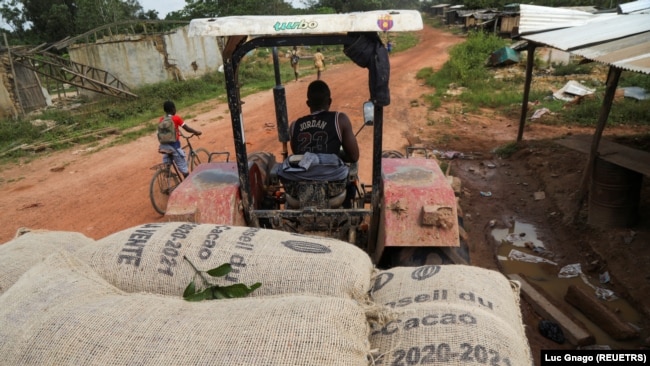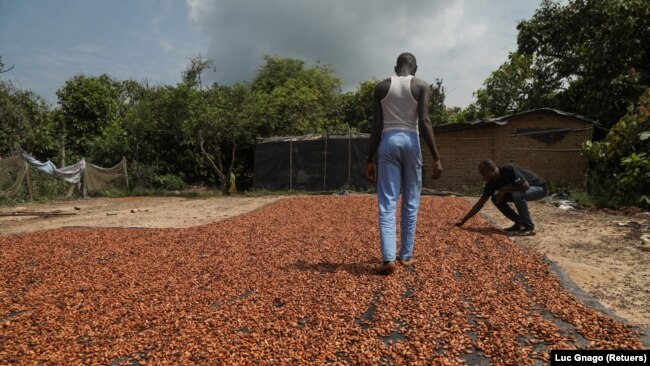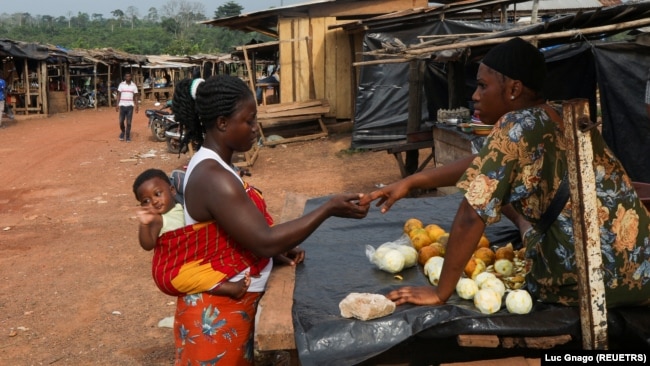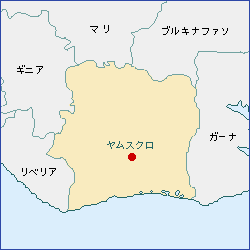自然界の恵みカカオ、Cote d'Ivoireの森林を守れ
チョコレート、大好きです!!
しかし、こんな形でコートジボワールの保護林を傷つけているとは。。。。。
好きなブランドが、もしそうだったら??
一消費者として、共に関心を持ちたなければいけませんよね!!
株主になって、総会で開示請求するのが一番早道かな?(なれれば・・・)
早速、
Let's get started!! VOA で英語と世界を学ぼう!!
コートジボワールは、世界最大のカカオ生産国です。ココアは、カカオという熱帯の木に種として育ちます。ココアはチョコレートの主原料です。
しかし、コートジボワール政府は、カカオ生産者が長年にわたって集中的に、そしてしばしば違法な農業を行ってきたことから、カカオ生産者を罰しています。このような農法は、国の熱帯林を破壊してきました。
昨年2020年1月、あるカカオ栽培の集落が、コートジボアールの森林エージェントによって大きく破壊されました。農民たちはカカオを取り戻すために、村の残骸を調べました。
「彼らは村全体に火をつけたんだ」とアレクシス・クアシ・アクポエさんは言います。アレクシス・クアシ・アクポエさんは、保護林であるRapides Grahラピデス・グラの集落に捜査官が入ってきた日のことを話してくれました。彼をはじめとする何千人もの農民が、違法にカカオを植えていたのです。「翌朝5時にはブルドーザーが入ってきました」。
ロイター通信の記者が1年後に村を訪れると、ビジネスは復活し、順調に推移していたといいます。農家は廃墟と化した建物の中でカカオ豆を乾燥させ、袋詰めしていました。買い手は質の高いカカオを求めています。そのほとんどが、ヨーロッパで作られるチョコレートやお菓子に使われています。

A truck transports bags of cocoa in the Ivorian cocoa farming village of Djigbadji, commonly known as Bandikro or Bandit Town, located inside the Rapides Grah protected forest on January 7, 2021. (REUTERS/Luc Gnago)2021年1月7日、Rapides Grah保護林内にあるコートジボワールのカカオ栽培村、通称BandikroまたはBandit Townで、カカオの袋を運ぶトラック。(REUTERS/Luc Gnago)
ヨーロッパが注目
チョコレートやココアの大手企業は、違法に栽培されたココアが自社のサプライチェーンに混入していないかを調べています。欧州連合(EU)の関係者は、コートジボワール政府の森林保護への取り組みは十分ではないとしています。
欧州委員会は11月17日、この問題に対処するための法案を提案しました。この法案は、企業に対し、国際的なサプライチェーンにおける環境および人権上のリスクを発見し、解決するように働きかけるもので、さもなければ罰せられます。
企業は、特定の日以降に森林破壊された土地で栽培されたカカオの調達を制限されます。正確な日付は法律で定められます。
EU議会議員のDelara Burkhardtデララ・ブルクハルト氏は、森林破壊を止めるための企業の自主的な努力は”ほとんど失敗している”と述べています。この法律は、早ければ2023年に何らかの形で成立する見込みです。
チョコレート会社やココア会社は、この新しい法律を支持するとしていますが、自分たちの努力が失敗したことには同意していません。彼らはロイターに対し、自社で使用しているカカオがラピッズ・グラーの森やその他の違法な農業経営から来たものではないことを確信していると述べています。

People dry cocoa beans in the Ivorian cocoa farming village of Djigbadji inside the Rapides Grah protected forest on January 7, 2020. Ivorian agents destroyed the village in January, 2020 but when Reuters visited a year later the village was alive once again. (REUTERS/Luc Gnago)2020年1月7日、ラピッド・グラー保護林内のコートジボアールのカカオ農園村でカカオ豆を乾燥させる人々。コートジボワールのエージェントは2020年1月に村を破壊したが、1年後にロイターが訪れたときには、村は再び生き返っていた。(REUTERS/Luc Gnago)
失敗した保護
業界をリードするカカオ承認委員会は、保護地域にある何千もの農場が、承認されるべきではないのに承認を受けていたと発表しました。
また、購入した書類や農家との話し合いでは、チョコレート業界の大手企業の中には、少なくとも一部のココアを保護林から受け取っているところがあるようです。これらの企業には、Nestle, Mars Inc, Cargill Inc, and Touton S.A.ネスレ、マース・インク、カーギル・インク、トートンS.A.などがあります。
ロイターは、違法に栽培されたカカオの各企業への出荷を追跡調査していなせん。カーギル社、マース社、ネスレ社は、違法に栽培されたカカオは購入していないと述べています。トートン社は、ロイターのコメントの求めてにも答えていません。
ココアがどこから来たのかを追跡するのは非常に困難です。これは、農家のグループが、自分たちの承認したグループのメンバーではない生産者から購入していることが一因となっています。コートジボワールの水・森林省は、毎年生産される200万トンのココアのうち、20〜30%が違法に栽培されていると推定しています。また、違法に栽培されたカカオのほとんどが国際的なサプライチェーンに入っていると考えています。
アラン・リシャール・ドンワヒ水・森林相は、「このような事態を食い止めたい」と語りました。
コートジボワール政府は、問題の原因は地元住民にあるとしています。しかし、国際的な企業が森林破壊によって利益を上げ続けていることも指摘しています。これらの企業には、森林の回復を助ける責任があります。
Ivory Coast Battles to Save Forests Destroyed by Cocoa Farming

FILE - A woman buys fruit in the Ivorian cocoa farming village of Djigbadgi, commonly known as Bandikro or Bandit Town, located inside the Rapides Grah protected forest on January 7, 2021. (REUTERS/Luc Gnago
The Ivory Coast is the world’s top cocoa-growing country. Cocoa grows as seeds on a tropical tree called the cacao. Cocoa is the main element used in making chocolate.
The Ivorian government is punishing cocoa growers, however, after years of intensive and often illegal farming. Such farming methods have destroyed the country’s tropical forests.
In January of 2020, one cocoa-growing settlement was largely destroyed last year by Ivorian forest agents. Farmers went through the remains of their village to recover the cocoa.
"They set the whole village on fire," said Alexis Kouassi Akpoue. He was describing the day when the agents when through the settlement in Rapides Grah, a protected forest. He and thousands of other farmers had planted cocoa there illegally. “The next morning at 5 o’clock they sent in the bulldozers,” he added.
Reporters with the Reuters news agency visited the village a year later. Business, they said, was back and doing well. Farmers dried and bagged cocoa beans among the ruined buildings. Buyers searched for quality cocoa. Most of it would later be used in chocolate and other sweets made in Europe.

Europe is watching
Leading chocolate and cocoa companies are examining their own supply chain for illegally grown cocoa. European Union officials say the Ivorian government’s efforts to protect the forests are not enough.
The European Commission proposed legislation on November 17 to deal with the issue. The legislation would push companies to find and fix environmental and human rights risks in their international supply chains -- or face punishment.
Companies would be restricted from sourcing cocoa grown on land deforested after a given date. The exact date would be set by the law.
EU Parliament member Delara Burkhardt said voluntary efforts by companies to stop deforestation “have largely failed.” The legislation is expected to pass in some form as soon as 2023.
Chocolate and cocoa companies say they support the new laws but do not agree that their own efforts have failed. They told Reuters they are sure that the cocoa they use does not come from the Rapides Grah forest or other illegal farming operations.

Failed protection
The industry’s leading cocoa approval committee has said that thousands of farms in protected areas received approval when they should not have.
In addition, purchasing documents as well as talks with farmers suggest that some of the chocolate industry’s biggest companies do receive at least some of their cocoa from protected forests. These companies include Nestle, Mars Inc, Cargill Inc, and Touton S.A.
Reuters did not follow individual shipments of illegally farmed cocoa to the companies. Cargill, Mars, and Nestle have said they have not bought illegally grown cocoa. Touton did not answer Reuters’ requests for comment.
It is extremely difficult to follow where cocoa has come from. This is in part because groups of farmers buy from growers who are not members of their approved group. Ivory Coast’s Ministry of Water and Forests estimates 20 to 30 percent of the 2 million metric tons of cocoa produced each year is grown illegally. It believes that almost all illegally grown cocoa enters the international supply chain.
"We want that to stop," said Water and Forests Minister Alain-Richard Donwahi.
The Ivorian government says it blames locals for the problem. But it notes that international companies continue to make money from deforestation. And those companies have a responsibility to help forests recover.
Words in This Story
tropical – adj. of, relating to, occurring in, or used in the tropics
bulldozer – n. a powerful and heavy vehicle that has a large curved piece of metal at its front and that is used for moving dirt and rocks and pushing over trees and other structures
bag – v. to put (something) into a container made of thin material (such as paper, plastic, or cloth) that opens at the top and is used for holding or carrying things
bean – n. a seed that looks like a bean but that does not come from a climbing plant
chocolate – n. a food that is made from cacao beans and that is eaten as candy or used as a flavoring ingredient in other sweet foods
supply chain – n. everything used in the process to make, sell, and transport goods to buyers
deforestation – n. the act or result of cutting down or burning all the trees in an area
コートジボワール共和国 Ivory Coast
“Ivory Coast” というのは、コートジボワールの英語名
コートジボワール政府は1986年に “Côte d’Ivoire” を正式国名にすると宣言していますが、英語圏ではいまだに大手メディアでも “Ivory Coast” という表記を使用していることが多いみたいです。
検索結果
マップの結果
Republic of Cote d'Ivoire
面積:322,436平方キロメートル(日本の約0.9倍)
首都:ヤムスクロ(Yamoussoukro)
(実質的首都機能はアビジャン)民族:60以上の民族から構成
言語:フランス語(公用語)、各民族語
政体:共和制人口:2,638万人(2020年 世銀)
英語の小窓
今日は2つ取り上げます。
1 無生物主語
The legislation would push companies to find and fix environmental and human rights risks in their international supply chains -- or face punishment.
日本語では出にくい発想ですよね!
2 be restricted from
Companies would be restricted from sourcing cocoa grown on land deforested after a given date.
restrictは「制限する、限定する」の意味。
禁止はしてはダメなことですが、restrictは条件などを満たせば可能な点で違います。
よく「be restricted to(~に制限されている) 」の形で用いられることが多いですが、「to」をとるか「from」をとるかで意味が異なってきます。
⭐️be restricted to 「~に制限されている」
This movie is restricted to people over 18.
この映画は18歳以上に規制されています。
⭐️be restricted from 「~を制限されている」
We are restricted from the playing court during the game.
私たちは試合中はプレーコートへ入ることを制限されています。
ややこしいですよね!

